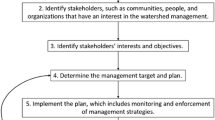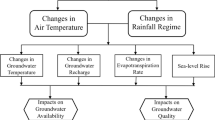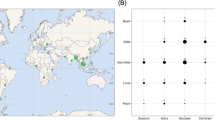Abstract
A combined assessment of the potential impacts from climate change (CC) and socio-economic development (SED) on water resources is presented for the most important aquifer in the south of Portugal. The goal is to understand how CC and SED affect the currently large pressures from water consuming and contaminating activities, predominantly agriculture. Short-term (2020–2050) and long-term (2070–2100) CC scenarios were developed and used to build aquifer recharge and crop water demand scenarios, using different methods to account for uncertainty. SED scenarios were developed using bottom-up and top-down methods, and discussed at workshops with farmers and institutional stakeholders in the water sector. Groundwater use was quantified for each scenario. Together with the recharge scenarios, these were run through a calibrated groundwater flow model, to study their individual and joint impacts on groundwater levels and discharge rates into a coastal estuary. Recharge scenarios show clear negative long-term trends and short-term increase in temporal variability of recharge, though short-term model uncertainties are higher. SED scenario 1 (SED1), predicting intensification and decline of small farms, considered the most likely by all workshop participants, shows a large drop in agricultural area and water demand. SED2, a most desired scenario by farmers, foresees growth and modernization of agriculture, but proves unsustainable in combination with predicted CC without efficient adaptation measures. The results thus reveal that CC in the region will dynamically interact with economic factors, and going one step beyond, CC could be directly integrated as a constraint in the development of SED scenarios. Exercises involving the integration of CC and SED regionally based scenarios, constructed in both bottom-up and top- down fashion and discussed in participatory contexts are still rarely used for adaptation, and specifically adaptation of agriculture to water scarcity. The joint analysis of CC and SED revealed challenging, as it involved the use of different methods across the border between natural and social sciences. In our view this method contributes in an encouraging manner to a more holistic and transdisciplinary water management, by allowing a more plausible identification of what (and if) adaptation measures are needed.






Similar content being viewed by others
Notes
Although over the past two to three years there has been an increase in the discussion (in workshops, conferences, meetings, workgroups) about integrating SED scenarios with CC scenarios, to support adaptation decision by resource users and policy makers alike (Ebi et al. 2014), research actually carrying it out is, to our knowledge, still very scarce.
This ability to explore the future was progressively developed during the project (which in itself was the accomplishment of the social learning objectives of this project).
References
Allen RG, Pereira LS, Raes D, Smith M (1998) Crop evapotranspiration – guidelines for computing crop water requirements FAO. Irrigation and Drainage Paper nr 56
Bennett EM, Zurek MB (2006) Integrating epistemologies though scenarios. In: Reid WV, Berkes F, Wilbanks T, Capistrano D (eds) Bridging scales and knowledge systems: concepts and applications in ecosystem assessment. Island Press, Washington, pp 275–294
Berkhout F, Hertin J, Jordan A (2002) Socioeconomic futures in climate change impact assessment: using scenarios as ‘learning machines’. Glob Environ Chang 12:83–95
Brouyère S, Carabin G, Dassargues A (2004) Climate change impacts on groundwater resources: modelled deficits in a chalky aquifer, Geer basin, Belgium. Hydrogeol J 12:123–134
Candela L, von Igel W, Elorza FJ, Aronica G (2009) Impact assessment of combined climate and management scenarios on groundwater resources and associated wetland (Majorca, Spain). J Hydrol 376:510–527
Dripps WR, Bradbury KR (2007) A simple daily soil–water balance model for estimating the spatial and temporal distribution of groundwater recharge in temperate humid areas. Hydrogeol J 15:433–444
Eakin H, Magaña V, Smith J, Moreno JL, Martínez JM, Landavazo O (2007) A stakeholder driven process to reduce vulnerability to climate change in Hermosillo, Sonora, Mexico. Mitig Adapt Strateg Glob Change 12:935–955
Ebi KL, Hallegatte S, Kram T et al (2014) New scenario framework for climate change research background process and future directions. Clim Chang 122:363–372
Faysse N, Rinaudo J-D, Bento S et al (2014) Participatory analysis for adaptation to climate change in Mediterranean agricultural systems: making use of possible choices in process design. Reg Environ Chang 14(S1):57–70
Fung A (2006) Varieties of participation in complex governance. Public Adm Rev Dec(SI):66–75
Giorgi F (2006) Climate change hot-spots. Geophys Res Lett 33:L08707
Goderniaux P, Brouyère S, Blenkinsop S, Burton A, Fowler HJ, Orban P, Dassargues A (2011) Modeling climate change impacts on groundwater resources using transient stochastic climatic scenarios. Water Resour Res 47:W12516, 17 pp
Hagemeier-Klose M, Beichler SA, Davidse BJ, Deppish S (2014) Knowledge loop: inter- and transdisciplinary cooperation and adaptation of climate change knowledge. Int J Disaster Risk Sci 5:21–32. doi:10.1007/s13753-014-0015-4
Harrison PA, Holman IP, Cojocaru G, Kok K, Kontogianni K, Metzger MJ, Gramberger G (2013) Combining qualitative and quantitative understanding for exploring cross-sectoral climate change impacts, adaptation and vulnerability in Europe. Reg Environ Chang 13:761–780
Harrison PA, Holman IP, Berry PM (2015) Assessing cross-sectoral climate change impacts, vulnerability and adaptation: an introduction to the CLIMSAVE project. Clim Chang 128:153–167
Hatzilacou D, Kallis G, Mexa A, Coccosis H, Svoronou E (2007) Scenario workshops: a useful method for participatory water resources planning? Water Resour Res 43:W06414
Hawkins E, Sutton R (2009) The potential to narrow uncertainty in regional climate predictions. Bull Am Meteorol Soc 90:1095–1107
Holman IP, Allen DM, Cuthbert MO, Goderniaux P (2012) Towards best practice for assessing the impacts of climate change on groundwater. Hydrogeol J 20:1–4
Hugman R, Stigter TY, Monteiro JP, Nunes L (2012) Influence of aquifer properties and the spatial and temporal distribution of recharge and abstraction on sustainable yields in semi-arid regions. Hydrol Process 26:2791–2801
Jackson CR, Meister R, Prudhomme C (2011) Modelling the effects of climate change and its uncertainty on UK Chalk groundwater resources from an ensemble of global climate model projections. J Hydrol 399:12–28
Klein JT (2010) Creating interdisciplinary campus cultures. Jossey Bass, San Francisco
Koskinen L, Laitinen M, Lofman J, Meling K, Meszaros F (1996) FEFLOW: a finite element code for simulating groundwater flow heat transfer and solute transport. In: Proceedings of the International Conference on Development and Application of Computer Techniques to Environmental Studies, pp 287–296
Kuruppu N (2009) Adapting water resources to climate change in Kiribati: the importance of cultural values and meaning. Environ Sci Pol 12(7):799–808
Lorenzoni I, Jordan A, Hulme M, Turner MK, O’Riordan T (2000) A co-evolutionary approach to climate change impact assessment: part I. Integrating socio-economic and climate change scenarios. Glob Environ Chang 10:57–68
Lowe P, Phillipson J (2009) Barriers to research collaboration across disciplines: scientific paradigms and institutional practices. Environ Plan A 41(5):1171–1184
Monteiro JP, Vieira J, Nunes L, Fakir Y (2006) Inverse calibration of a regional flow model for the Querença-Silves aquifer system, Algarve-Portugal. Integrated water resources management and challenges of the sustainable development, IAH Marrakech, pp 44
Nakićenović N, Swart R (eds) (2000) Special report on emissions scenarios: a special report of working group III of the intergovernmental panel on climate change. Cambridge University Press, Cambridge
Nohara D, Kitoh A, Hosaka M, Oki T (2006) Impact of climate change on river discharge projected by multimodel ensemble. J Hydrometeorol 7(5):1076–1089
Norgaard RB (1994) Development betrayed: the end of progress and a co-evolutionary revisioning of the future. Routledge, London, p 296
Oliveira MM, Oliveira L, Lobo Ferreira JP (2008) Estimativa da recarga natural no Sistema Aquífero de Querença-Silves (Algarve) pela aplicação do modelo BALSEQ_MOD. In: Proc. of 9.° Congresso da Água, Cascais, 2–4 April 2008, CD 15 pp
Ondersteijn CJM, Beldman ACG, Daatselaar CHG, Giesen GWJ, Huirne RBM (2002) The Dutch mineral accounting system and the European nitrate directive: implications for N and P management and farm performance. Agric Ecosyst Environ 92:283–296
Parry ML, Canziani OF, Palutikof JP, van der Linden PJ, Hanson CE (eds) (2007) Contribution of Working Group II to the fourth assessment report of the intergovernmental panel on climate change. Cambridge University Press, Cambridge
Patel M, Kok K, Rothman DS (2007) Participatory scenario construction in land use analysis: an insight into the experiences created by stakeholder involvement in the Northern Mediterranean. Land Use Policy 24:546–561
Peterson GD, Beard Jr. TD, Beisner BE, Bennett EM, Carpenter SR, Cumming GS, Dent CL, Havlicek TD (2003) Assessing future ecosystem services: a case study of the Northern Highlands Lake District, Wisconsin, Conservation Ecology 7(3): 1. [online] URL: http://www.consecol.org/vol7/iss3/art1/
Rinaudo JD, Montginoul M, Varanda M, Bento S (2012) Envisioning innovative groundwater regulation policies through scenario workshops in France and Portugal. Irrig Drain 61(1):65–74
Roncoli C (2006) Ethnographic and participatory approaches to research on farmers’ responses to climate predictions. Clim Res 33:81–99
Rounsevell MDA, Metzger MJ (2010) Developing qualitative scenario storylines for environmental change assessment. Wiley Interdiscip Rev Clim Chang 1(4):606–619
Scanlon BR, Mace RE, Barrett ME, Smith B (2003) Can we simulate regional groundwater flow in a karst system using equivalent porous media models? Case study, Barton Springs Edwards aquifer, USA. J Hydrol 276:137–158
Silva ACF, Tavares P, Shapouri M, Stigter TY, Monteiro JP, Machado M, Cancela da Fonseca L, Ribeiro L (2012) Estuarine biodiversity as an indicator of groundwater discharge. Estuar Coast Shelf Sci 97:38–43
Stigter TY, Monteiro JP, Nunes LM (2009) Screening of sustainable groundwater sources for integration into a regional drought-prone water supply system. Hydrol Earth Syst Sci 13:1–15
Stigter TY, Carvalho Dill AMM, Ribeiro L (2011) Major issues regarding the efficiency of monitoring programs for nitrate contaminated groundwater. Environ Sci Technol 45:8674–8682
Stigter TY, Nunes JP, Pisani B et al (2014) Comparative assessment of climate change and its impacts on three coastal aquifers in the Mediterranean. Reg Environ Chang 14(S1):41–56
Thompkins EL (2008) Scenario-based stakeholder engagement: incorporating stakeholders preferences into coastal planning for climate change. J Environ Manag 88:1580–1592
UNESCO (2010) World social science report: knowledge divides, UNESCO Publishing. http://www.unesco.org/new/en/social-and-human-sciences/resources/reports/world-social-science-report/
Van der Helm R (2003) Challenging futures studies to enhance EU’s participatory river basin management. Phys Chem Earth 28:563–570
Van Der Linden P, Mitchell JFB (eds) (2009) ENSEMBLES: climate change and its impacts: summary of research and results from the ENSEMBLES project. Met Office Hadley Ctr, Exeter
Varanda M, Bento S (2012) Alterações climáticas e circulação do saber entre ciência e prática: uma via de um sentido, dois sentidos ou um beco sem saída. 2ª Jornada Ciêntifica da Rede MUSSI “Redes e processos info-comunicacionais: mediações, memórias, apropriações”, ANAIS 2012. ISBN: 978-85-85471-18-4
Vieira J, Cunha MC, Nunes L, Monteiro JP, Ribeiro L, Stigter T, Nascimento J, Lucas H (2011) Optimization of the operation of large-scale multisource water supply systems. J Water Res Pl-ASCE 137:150–161
Wesche SD, Armitage DR (2013) Using qualitative scenarios to understand regional environmental change in the Canadian North. Reg Environ Chang 14:1095–1108
Wetherald RT, Manabe S (2002) Simulation of hydrologic changes associated with global warming. J Geophys Res 107(D19):4379–4393
Acknowledgments
The research that supports this paper was performed within the scope of the CLIMWAT and AQUIMED projects funded under the CIRCLE-2 ERA-Net. The authors wish to acknowledge the Fundação para a Ciência e a Tecnologia for supporting this network. The collaboration of Claudia Gervasi was crucial for the development of the SED scenarios.
Author information
Authors and Affiliations
Corresponding author
Rights and permissions
About this article
Cite this article
Stigter, T.Y., Varanda, M., Bento, S. et al. Combined Assessment of Climate Change and Socio-Economic Development as Drivers of Freshwater Availability in the South of Portugal. Water Resour Manage 31, 609–628 (2017). https://doi.org/10.1007/s11269-015-0994-y
Received:
Accepted:
Published:
Issue Date:
DOI: https://doi.org/10.1007/s11269-015-0994-y




